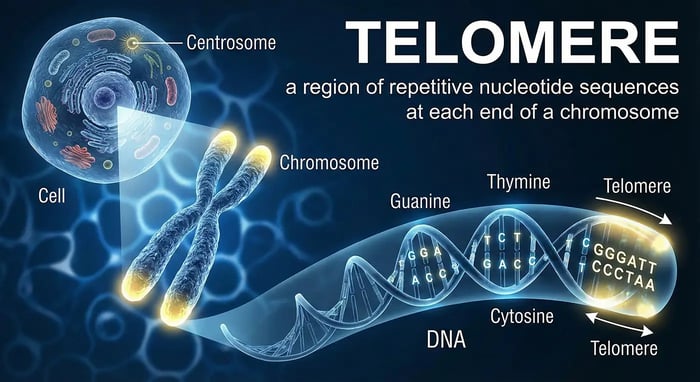Telomeres: The Revolutionary Connection Between Stem Cells and Cancer Prevention
Understanding telomeres opens up extraordinary possibilities for health and longevity. These protective caps at the ends of our chromosomes hold the key to cellular aging, stem cell function, and cancer prevention. Recent groundbreaking research reveals how telomeres act as molecular switches that determine whether cells maintain their youth or develop into disease states.
What Are Telomeres and Why They Transform Everything We Know About Aging
Telomeres function as protective shields for our DNA, much like the plastic tips on shoelaces prevent fraying. Every time a cell divides, telomeres shorten slightly. This natural process serves as a cellular clock, limiting how many times most cells can replicate. However, stem cells possess unique mechanisms that allow them to maintain their telomeres longer, enabling tissue regeneration throughout our lives.
The fascinating relationship between telomeres and stem cells reveals promising pathways for enhancing health span and preventing age-related diseases. Scientists have discovered that maintaining optimal telomere length through specific interventions can support stem cell function and reduce cancer risk simultaneously.
The Breakthrough Discovery: How Telomeres Control Stem Cell Destiny
A pioneering research team from Germany published revolutionary findings in the journal Cell that illuminate how telomeres influence whether stem cells remain healthy or transform into cancer cells. This research fundamentally changes our understanding of cellular aging and disease prevention.
Understanding Stem Cells: Your Body's Natural Renewal System
Stem cells serve as your body's master builders, possessing the remarkable ability to transform into any cell type needed for tissue repair and regeneration. Whether replacing worn-out skin cells, regenerating immune system components, or healing damaged organs, stem cells orchestrate your body's continuous renewal process.
What makes stem cells extraordinary compared to regular cells? Several key factors enable their regenerative powers:
- Enhanced telomerase activity - Stem cells produce more telomerase enzyme, which rebuilds and maintains telomeres
- Superior DNA repair mechanisms - Advanced quality control systems fix genetic damage before it accumulates
- Extended replication capacity - While normal cells divide 50-70 times, stem cells can replicate hundreds of times
- Metabolic flexibility - Stem cells adapt their energy production to support longevity
The Telomere Balance: A Molecular Switch Between Health and Disease
Researchers discovered that telomeres act as sophisticated sensors within stem cells, creating a delicate balance that determines cellular fate. When telomeres maintain optimal length and structure, stem cells continue their beneficial regenerative functions. However, when telomeres become critically short or damaged, they trigger one of two pathways:
- Cellular senescence - The cell enters a protective dormant state, preventing further division
- Malignant transformation - Under certain conditions, damaged cells may evade safety mechanisms and become cancerous
This groundbreaking insight reveals telomeres as master regulators of cellular health, not merely passive timekeepers. By understanding and supporting this balance, we can potentially guide stem cells toward healthy outcomes while preventing cancer development.
Revolutionary Evidence: Telomerase as a Protective Force
Contrary to earlier concerns about telomerase potentially promoting cancer, new research demonstrates that appropriate telomerase activity actually protects against malignancy. Studies show that maintaining healthy telomere length through enhanced telomerase function helps stem cells manage replication stress more effectively.
Key Benefits of Optimal Telomere Maintenance
Supporting healthy telomeres through natural telomerase activation provides multiple advantages:
- Enhanced stem cell function - Longer telomeres enable stem cells to maintain their regenerative capacity
- Reduced cancer risk - Stable telomeres prevent the genomic instability that leads to malignancy
- Improved tissue regeneration - Healthy stem cells more effectively replace damaged cells throughout the body
- Extended health span - Maintaining telomere length supports overall vitality and longevity
Practical Strategies for Supporting Telomere Health
Scientific research identifies several evidence-based approaches to maintain and even lengthen telomeres naturally:
Lifestyle Factors That Protect Telomeres
- Regular exercise - Moderate aerobic activity increases telomerase activity by up to 200%
- Stress management - Meditation and mindfulness practices reduce telomere-shortening stress hormones
- Quality sleep - Seven to nine hours nightly supports cellular repair and telomere maintenance
- Mediterranean diet - Rich in antioxidants and omega-3 fatty acids that protect telomeres
- Social connections - Strong relationships correlate with longer telomeres and better health outcomes
Nutritional Support for Telomere Length
Specific nutrients demonstrate powerful effects on telomere preservation:
| Nutrient | Food Sources | Telomere Benefits |
|---|---|---|
| Omega-3 fatty acids | Wild salmon, walnuts, flaxseeds | Reduces inflammation and oxidative stress on telomeres |
| Vitamin D | Sunlight, fortified foods, supplements | Activates telomerase enzyme production |
| Folate | Leafy greens, legumes, citrus fruits | Supports DNA methylation and telomere stability |
| Magnesium | Dark chocolate, avocados, nuts | Essential for telomerase function |
| Polyphenols | Green tea, berries, dark grapes | Protects telomeres from oxidative damage |
The Future of Telomere Science: Transforming Healthcare
Emerging research continues to unveil the profound impact of telomeres on human health. Scientists now recognize telomere length as a biomarker for biological age, providing insights far beyond chronological age. This knowledge empowers individuals to take proactive steps toward optimal health and longevity.
Breakthrough Applications in Development
The field of telomere biology promises revolutionary advances in multiple areas:
- Regenerative medicine - Enhancing stem cell therapies through telomere optimization
- Cancer prevention - Early detection and intervention based on telomere patterns
- Age reversal - Protocols to restore youthful telomere length in aged tissues
- Personalized health - Tailored interventions based on individual telomere profiles
Success Stories: Real People Transforming Their Telomere Health
Individuals worldwide report remarkable improvements after implementing telomere-supportive practices. Marathon runners in their 70s maintain telomere lengths comparable to people decades younger. Meditation practitioners show measurable telomere lengthening after just eight weeks of practice. These inspiring examples demonstrate that age truly becomes just a number when we support our cellular health.
Creating Your Personal Telomere Protection Plan
Starting your journey toward optimal telomere health requires simple, consistent actions:
- Baseline assessment - Consider telomere testing to establish your starting point
- Daily movement - Incorporate 30 minutes of enjoyable physical activity
- Stress resilience - Develop a 10-minute daily relaxation practice
- Nutrient density - Add one telomere-supporting food to each meal
- Sleep optimization - Create a consistent bedtime routine for restorative rest
- Community connection - Nurture relationships that bring joy and support
Conclusion: Your Telomeres, Your Future
The science of telomeres reveals an empowering truth: we possess significant control over our cellular aging process. By understanding how telomeres influence stem cell function and cancer risk, we can make informed choices that support vibrant health throughout life. The balance between cellular renewal and protection lies within our telomeres, and science now provides the roadmap to optimize this critical system.
Every positive choice you make supports your telomeres and enhances your potential for a long, healthy life. The future of personalized health begins with understanding and nurturing these molecular guardians of youth. Start your telomere optimization journey today and discover the transformative power of cellular health.
Frequently Asked Questions About Telomeres
What exactly are telomeres and how do they affect aging?
Telomeres are protective DNA sequences at the ends of chromosomes that shorten with each cell division. They act as biological clocks, determining how many times a cell can divide before entering senescence. Longer telomeres associate with better health outcomes, reduced disease risk, and extended lifespan. By maintaining telomere length through lifestyle choices and targeted interventions, you can potentially slow biological aging and maintain youthful cellular function longer.
Can telomeres actually be lengthened once they shorten?
Yes, research demonstrates that telomeres can be lengthened through various interventions. Regular exercise, stress reduction techniques like meditation, quality sleep, and specific nutritional strategies all show promise for increasing telomere length. Studies document telomere lengthening of 10% or more through comprehensive lifestyle programs. The enzyme telomerase, naturally present in stem cells, can rebuild telomeres when activated through healthy practices.
How do telomeres relate to cancer development?
Telomeres play a dual role in cancer biology. Short, damaged telomeres can trigger genomic instability that leads to cancer initiation. However, cancer cells often reactivate telomerase to achieve unlimited replication. The key lies in maintaining healthy telomere length in normal cells while preventing abnormal telomerase activation in potentially cancerous cells. Supporting natural telomere maintenance through lifestyle factors provides protection against cancer while promoting healthy cellular function.
What role do stem cells play in telomere biology?
Stem cells possess unique telomere maintenance mechanisms that enable their regenerative abilities. They naturally produce higher levels of telomerase enzyme, allowing them to divide many more times than regular cells. This enhanced telomere protection enables stem cells to continuously replenish tissues throughout life. Supporting stem cell telomere health through optimal nutrition, exercise, and stress management enhances your body's natural repair and regeneration capacity.
How can I test my telomere length?
Several companies now offer telomere testing through simple blood samples. These tests measure average telomere length and compare it to age-matched populations, providing your biological age versus chronological age. Testing every 6-12 months can track progress as you implement telomere-supportive practices. While not essential, testing provides valuable feedback and motivation for maintaining healthy lifestyle choices that protect your telomeres.
What foods best support telomere health?
Foods rich in antioxidants, omega-3 fatty acids, and specific vitamins powerfully support telomere maintenance. Wild-caught salmon, walnuts, blueberries, dark leafy greens, and green tea top the list. The Mediterranean diet pattern, emphasizing whole foods, healthy fats, and minimal processed ingredients, consistently associates with longer telomeres. Adding these foods daily while reducing sugar and processed foods creates an optimal environment for telomere protection.
How quickly can lifestyle changes impact telomere length?
Positive changes in telomere length can occur surprisingly quickly. Studies show measurable improvements in telomerase activity within days of implementing healthy practices. Significant telomere lengthening typically appears within 3-6 months of consistent lifestyle modification. Even modest changes like adding 30 minutes of daily walking or 10 minutes of meditation create measurable benefits. The key is consistency rather than perfection in your approach.
Are telomere supplements effective?
Certain supplements show promise for supporting telomere health when combined with healthy lifestyle practices. Omega-3 fatty acids, vitamin D, magnesium, and specific antioxidants demonstrate benefits in research studies. Natural compounds that activate telomerase enzyme also show potential. However, supplements work best as part of a comprehensive approach including diet, exercise, stress management, and quality sleep rather than as standalone solutions.
Can stress really damage telomeres?
Chronic stress significantly accelerates telomere shortening through multiple mechanisms. Stress hormones like cortisol increase oxidative damage to telomeres while suppressing telomerase activity. Studies show caregivers under chronic stress have telomeres equivalent to a decade of additional aging. Fortunately, stress reduction techniques like meditation, yoga, and social support can reverse this damage, with some studies showing telomere lengthening after stress management interventions.
What is the connection between exercise and telomeres?
Exercise emerges as one of the most powerful telomere protectors. Regular moderate exercise increases telomerase activity, reduces inflammation, and enhances antioxidant defenses that protect telomeres. Studies show master athletes have telomeres comparable to sedentary individuals 20 years younger. Even starting exercise later in life provides benefits. The optimal amount appears to be 45-60 minutes of moderate activity most days, with both aerobic and resistance training showing positive effects.







